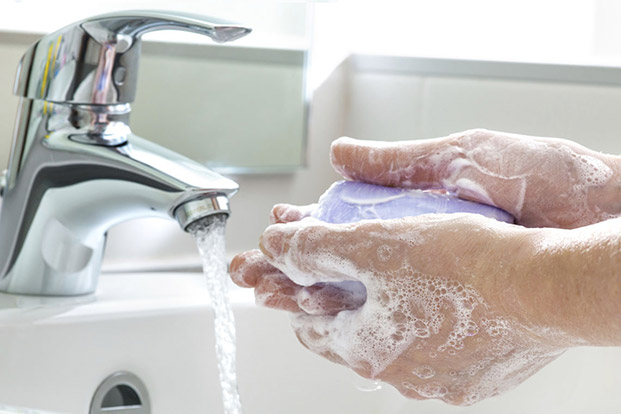When to Wash your Hands
Apr 19, 2022
Hand washing & Hand Hygiene plays an important role in day to day life. The habit of frequent hand washing, washes away 90 -95 % bacteria, viruses & other germs from our hands, thus preventing us from various diseases, like common cold to the more serious illnesses, such as meningitis, flu, Hepatitis A, Typhoid fever and most types of infectious diarrhea.
We all carry significant bacteria and other germs on our hands due to day to day activities, knowingly or unknowingly e.g. as a result of touching our pet animals, coughing, sneezing, using toilet, while changing baby diaper, caring of a sick person, etc.

The load of bacteria & other germs is highest in hospitals & nursing home because of:
- Infected Patients,
- Infected Body fluids/ Blood/Urine/Stool – Contaminating the surrounding things including, patients Beds, attendant bed, IV stand medicine trolley, food trolley, bedpans etc.
- Coughing/Sneezing by patients & other people – leading to droplets in air.
- So, more stringent hand washings, norms are followed in hospitals &healthcare institutions.
WHO – 5 Moments of Hand Hygiene- The points that highlight that you need to wash your hands immediately before doing anything are:
- Before touching a patient
- Before clean/aseptic procedure
- After body fluid, blood, urine, stool exposure risk
- After touching the patients
- After touching patient surroundings
Hand washing is equally important outside the hospital environment i.e. In your homes, office, schools (most important) Public places, Railway stations, Bus stands, Restaurant, Hotels, etc.
There is a big list as to when you should wash your hands, the important ones are:
- Before, during & after preparing food, handling raw meat is most dangerous
- Before & after eating food
- Before & after caring for a sick person, including changing his clothes
- Before & after treating a cut or a wound
- After touching an Animal/Pet/Bird, animal feed or animal waste.
- After touching garbage
- After using the toilet
- After changing diapers or cleaning up a child who has used the toilet
- After Coughing, Sneezing or blowing your nose
- After coming home from outside, may be from your workplace, journey, railway station, airport, restaurant, market hospital, doctor clinic, etc
- After doing household work – like sweeping, cleaning shoes, dusting, working in garden.
- After touching children toys, animals/pet animal/birds toys, cage, utensils.
- All family members have to wash their hands, including children.
How to Wash Your Hands
- Wet your hands with clean, running water (warm or cold)
- Turn off the tap
- Apply soap
- Lather well by rubbing your hands against each other, including the back of your hands wrist, between fingers & under your nails.
- Scrub for 20 -30 seconds
- Rinse your hands under clean, running water.
- Dry your hands using a clean towel, disposable towel or air dry.
- If possible, use a disposable towel or elbow to turn off the water tap.
Alternative to Hand Washing
Hand washing is the best way to clean your hands of various bacteria, viruses and other germs. But if this facility is not available, like – outside your home, while travelling etc.
Then alcohol based hand sanitizers containing 60 -95 % of alcohol, can be used, Hand sanitizers do not eliminate all types of germs & are not as effective, when hands are visibly dirty or greasy.
You should keep Hand Sanitizers in your cars, purses & bags.
How to use Hand Sanitizers
- Take adequate amount of Hand Sanitizer on the palm of one hand.
- Rub your Hands together, including the back of hand, Inbetween fingers & underneath nail beds
- Keep on rubbing till it is dry.
School Children should be especially educated, about the benefits of hand washing and risk of getting serious infections and diseases on not following the habit of hand hygiene. There should be compulsory hand washing for school children, before – after meals & at regular interval.
Conclusion
Don’t underestimate the power & benefits of Hand washing. The little money & time you spend at the sink, could save your many trips to Doctor’s clinic & Hospitals.









